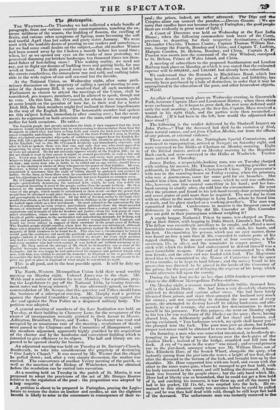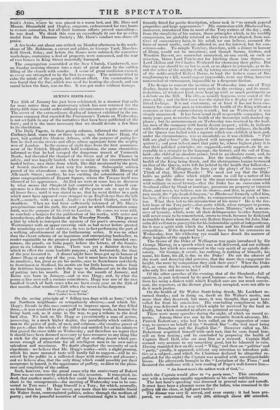An affair of honour took place on Wednesday evening, in
Greenwich' Park, between Captain Mass and Lieutenant Burton; when three shots were exchanged. As it began to grow dark, the rest were deferred until early the next morning ; when, at the first fire, Captain Mass received a wound in his right thigh, and the parties were then reconciled.— Standard. [If it had been in the left, how would the adjourned duel have stood ?] The following is the verdict delivered by the Shadwell Inquest on John Potts--" That the deceased had died by the visitation if God, from natural causes, and not from Cholera Morbus, nor from the effects of any poison, or external violence."
Three convicts, tried at the Nottingham Special Commission, and sentenced to transportation' arrived at New-gate on Saturday night, and were conveyed to the Hulks at Chatham on Monday morning. Eight of the Bristol rioters arrived on Monday morning by the Regulator Bath coach, and were conveyed to the Hulks at Woolwich. Twelve more arrived on Thursday.
James Batley, a respectable-looking man, was on Tuesday charged
with robbing his master, Mr. Thomas respectable-looking working-jeweller and
goldsmith, in Short's Buildings, Clerkenwell Close. The prosecutor's wife was in the counting-house on Friday evening, when the prisoner, who was a journeyman, came for sonic gold for six brooches. She handed him a box, and he took out some, which he said was sufficient She, however, saw him conceal something in his hand ; and her hus- band coming in shortly after, she told him the circumstance. He went
after the prisoner, and in his left-hand twenty-four pennyweights and seven grains of gold more than he required. The next day be went with an officer to the man's lodgings in Long Lane, where lie found him at work, and his place stocked as a working jeweller's. The man was committed for trial. Carelessness in masters is the frequent cause of dishonesty in servants. Why did Mr. Cusender or Mrs. Cusender give out gold to their journeyman without weighing it?
A sturdy beggar, Nathaniel Priest by name, was charged on Tues- day at Bow Street, with begging in Lillie. Street, Lincoln's Inn Fields. The fellow was exceedingly unwilling to he caught, and offered a most formidable resistance to the constables with his stick, his hands, and his feet. On examining his person, which was no easy matter, there was found no less a suni than .5/. lOs. concealed in various parts of his ragged clothing. The money consisted of four sovereigns, a half- sovereign, 17s. in silver, and the remainder in copper money. The stick with xvhich the fellow had endeavoured to defend himself was a most formidable weapon. One end of it was surmounted by a thick iron ferrule, and the other end was loaded with lead. The Magistrate dered him to be committed to the House of Correction for the space of two months, to be kept to hard labour ; and the money found in his possession was directed to be placed in the hands of the Governor of the prison, for the purpose of defraying the expense of' his keep, which would otherwise fall upon the county.
During the last four weeks no less than 4,070 drunken persons were tiken to the different Metropolitan Police-stations.
On Monday night, a woman named Elizabeth Stibbs drowned her- self is the London Docks. She had been a very disorderly character, addicted to drinking and various other vices. She had been lately liberated from prison, and since then annoyed the husband very much for money ; and not succeeding in draining the poor man of every penny, she attempted to destroy herself by taking laudanum, and ulti- mately, by way of revenge, she avowed her determination to drown herself in his presence. For this purpose, she went on Monday night to his box (he was watchman of the Docks) on the quay • there, having abused him, she deliberately pulled off her shawl and bonnet, and having exclaimed, " You barbarous wretch, my spirit shall haunt you !" she plunged into the lock. The poor man gave an alarm, but before proper assistance could be obtained to rescue her, she was drowned.
On Saturday, a man who was somewhat intoxicated, in heedlessly at- tempting to pass by the narrow footway over the dock-gates of the London Dock, instead of by the bridge, stumbled and fell into the dock. A cry of "a man in the water" was raised; and several persons ran to the pier-head, amongst whom was Mr. William Hore, son of Mrs. Elizabeth Hore, of the Scotch Wharf, alongside the quay, who instantly sprung from the pier into the water, a height of ten feet, dived after the deceased to the bottom of the lock, and brought him up by the shoulder. Mr. Hore supported him with one hand, and swam with the other to the inner water-gate, where he managed to get foot hold, with his body immersed in the water, and still holding the deceased. A boat- hook was lowered by the people-above; but the only band which Mr. Hore had at liberty was so benumbed, that he could not get a firm hold of it, and catching his trousers, it tore them up, and all the money he had in his pocket, 121. Ils. 6d., was emptied into the lock. He re- mained in this situation nearly ten minutes before he could be pulled up ; and he was then half dead with cold, though he still kept fast hold of the deceased. The unfortunate man was instantly removed to the.
...a. Scot's Arms, where he was placed in a warm bed, and Mr. Hore and Messrs. Bloomfield and Hopley, surgeons, endeavoured for two hours to restore animation, but all their humane efforts proved unavailing— he was dead. We think this case an exceedingly fit one for an extra medal from the Humane Society ; Mr. Hore'S conduct was above all praise.
A fire broke out about one o'clock on Monday afternoon in the work- shops of Mr. Robinson, a carver and gilder, in George Yard, Maccles- field Street, Soho ; and before the flames were subdued, the extensive workshops, containing a deal of property, were consumed, and the rear of two houses in King Street materially damaged.
The congregation assembled at the New Church, Camberwell, was on Sunday morning thrown into a state of great alarm by the sudden filling of the church with smoke. A scene of great confusion ensued, as every one attempted to be the first to escape. The minister tried to calm the minds of the people, but without effect. On examination, it was found that the flue, which was used for heating the church, and ran round below the floor, was on fire. It was got under without damage.



























 Previous page
Previous page